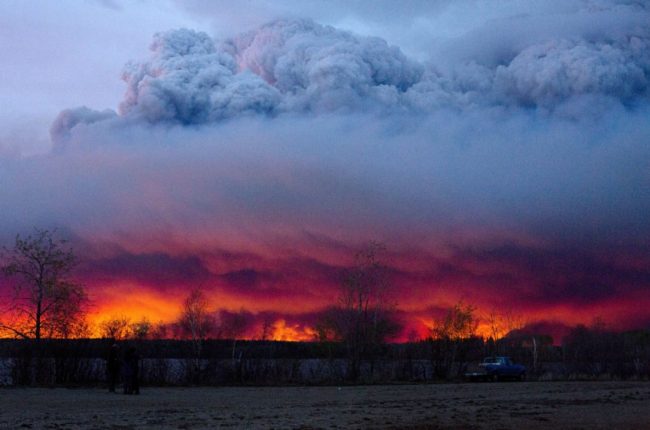The massive wildfire in the heart of Canada's oil country is helping send crude prices higher.
Benchmark U.S. crude rose 34 cents to $44.66 a barrel Friday in New York after earlier dropping by nearly 2 percent. Oil prices often spike when there is concern that production could be curtailed.
 |
A wildfire moves toward the town of Anzac on Wednesday, where was set up as an evacuation center for those ordered to leave Fort McMurray. (AP) |
Canada is the leading exporter of crude oil and natural gas to the United States, according to figures from the Energy Information Administration. Canada sends about 100 million barrels of crude and 240 billion cubic feet of natural gas per month to the U.S.
S&P Global Platts, which tracks the energy industry, estimated that up to 820,000 barrels a day of crude oil production were shut in by the fire, although the number could be lower if facilities were operating below peak capacity.
"It definitely is helping to boost the prices, although (the increase) is not that high considering the amount of crude that is being threatened," said Jeff Mower of Platts. He attributed the restrained market reaction to high inventories of crude in the U.S., especially in the Midwest, where much of the Canadian crude goes for refining.
Some grades of Canadian crude normally trade at premiums to benchmark U.S. oil while others usually trade at a discount, but all were trading higher Thursday and Friday than earlier in the week, according to Platts.
The fire is near the tar sands hub of Fort McMurray, Alberta. So far there are no reports of damage to production facilities. More than 80,000 people have left Fort McMurray, where the fire has torched 1,600 homes and other buildings.
Key pipelines were closed Thursday, although a major one reopened Friday morning, according to analysts for Genscape, which monitors the pipelines.
Much of the oil from the tar sands is refined in the United States. The impact on the U.S. oil market will depend on how long the interruption lasts.
If facilities are not damaged, "then the production cuts are only as long-lasting as the fires," said Dylan White, an oil storage analyst with Genscape. "Once the fires are subdued workers can come back to the production sites."
Ritterbusch and Associates, which advises oil traders, said that such a short-term outage shouldn't have much effect on oil prices because of a huge surplus of U.S. crude supplies. (AP)








